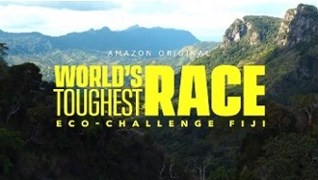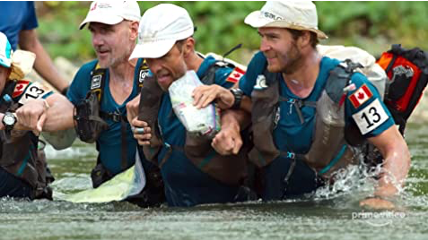
I just finished watching “World’s Toughest Race: Eco-Challenge Fiji”. It might sound a little familiar to some folks. The Eco-Challenge began in the mid-1990’s as a pioneering reality TV show. Mark Burnett created the idea back before he launched Survivor. Amazon brought it back as a new offering for their online streaming service and aired it this month. The actual race took place last fall in Fiji, so they held it in production for almost a year. The show is typical reality TV fare in some ways, in that they edit it to create suspense and keep you tuned it. One difference, though, is that the challenge of the race is not wholly manufactured and created as a game. The racers have to actually deal with the wilds of Fiji to get to the finish line.
When you hear it’s a race, it’s not like most races, not even other adventure races. This race is 417 miles long. Navigating the course requires that the co-ed teams of four must be able to hike, mountain bike, climb, rappel, paddle outriggers and paddleboards, whitewater raft, swim, and utilize canyoneering skills. They get a map and a compass, and then have to make it through a series of checkpoints. There is a time element, in that you have to make certain waypoints by a certain day and time in order to continue. As it is, the teams get spread out over more than fifty miles, as they move at different speeds.
This race included sixty-six teams, although a third of them failed to finish for one reason or another. Some teams were forced out by not making a waypoint in time. Others had to drop out because one of their teammates was ill or injured. The injuries can be life threatening. From hypothermia (after an hours-long swim in fifty-degree water), to infected cuts that threaten fatal side effects, to the adventure racing equivalent of trench foot, when the skin just starts to disintegrate. It’s not a race for the faint of heart.
The winners, a well-known adventure racing team from New Zealand, finished the course in 141 hours and twenty-three minutes. That’s just under six days, or about eighty-five miles a day. Let’s just say they didn’t sleep much. The final teams to finish did it in around eleven days, which is still an impressive average of thirty-eight miles per day. Regardless, it was impressive to watch these men and women manage incredibly difficult terrain in conditions that were, at times, dangerous.
I’d like to say that I watched the show and imagined that I could do those things. I know myself too well. I could not do some of the things those persons did, at least not tomorrow. Perhaps if I trained for a couple of years to round out my skills and build endurance and muscle, but I don’t have that level of fitness or expertise right now. I have to admit that I was impressed as I watched. There’s no other word to describe it. I didn’t see anyone who wasn’t displaying impressive effort and/or skills. I suppose inspiring is another word I’d use.

Perhaps the biggest takeaway was the importance of teams and the support they can offer. There isn’t a person alive who could traverse that course on their own, at least not in the timeframe the teams managed. Even the winners had to battle some tough situations that would have been difficult to manage for an individual (like flipping your outrigger during a nighttime ocean crossing!). Instead, the teams lifted each other up when the going got tough. Some teams had to carry a teammate (figuratively and literally) after someone suffered heat stroke, became ill, or sustained an injury. Some competitors explored the limits of their strength and their willpower and would have given up, were it not for their teammates, who coached them through it. Even more inspiring is how teams came together to support one another, even while competing against one another. There was an obvious sense of being in it together, even while being on opposing teams.
We like to think of ourselves as solitary much of the time. We praise the sentiment that people can lift themselves up and be self-sufficient. The truth is that very few of us are really self-sufficient, and almost none of us ever have to find out. Our lives are already so intertwined that it is almost impossible to conceive of a life that is not supported by others, whether we’re talking about family and friends, or the anonymous and unknown persons whose efforts and work support us every day in so many ways.
I suspect this is why Jesus is so adamant that we strive for unity and care for one another. He knows that we’re stronger together. We also know how much more successful we can be with God along for the journey. As Paul reminds us, “[We] can do all things through God, who strengthens [us].” The vast majority of us were not made to live life alone as hermits, untouched by others. We’re made for community, and we thrive in it. We can do so much more when we work together and encourage and support one another. Life may not be as complex as a four-hundred-mile race through tropical wilds, but it’s complex enough. It certainly has its challenges. Ultimately, we all have the same goal, the same finish line in mind. Imagine a world where everyone helped one another all along the journey. Imagine if we recognized that we could work together even while representing different teams. I think that’s exactly what God imagined when this reality of ours was created.
Tom+
O God the Father of our Lord Jesus Christ, our only Savior, the Prince of Peace: Give us grace seriously to lay to heart the great dangers we are in by our unhappy divisions; take away all hatred and prejudice, and whatever else may hinder us from godly union and concord; that, as there is but one Body and one Spirit, one hope of our calling, one Lord, one Faith, one Baptism, one God and Father of us all, so we may be all of one heart and of one soul, united in one holy bond of truth and peace, of faith and charity, and may with one mind and one mouth glorify you; through Jesus Christ our Lord. Amen.
